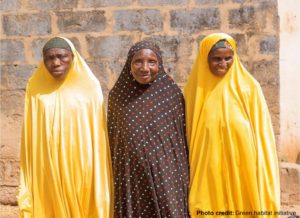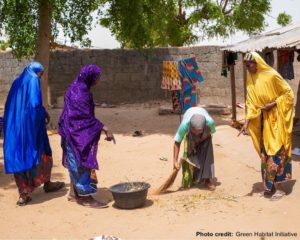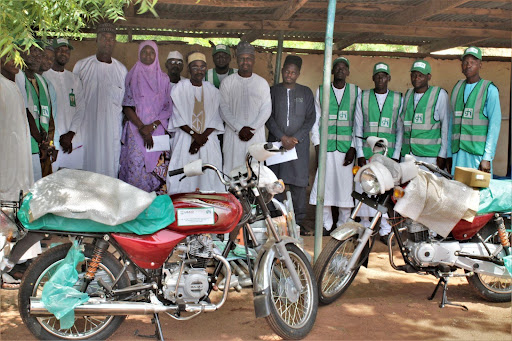
Green Habitat Initiative (GHI) funded by the United State Agency for International Development (USAID) is implementing the Project for Improved Sustainability of Integrated Water, Sanitation and Hygiene (I-WASH) in partnership with the Kebbi State government. This is in line with USAID’s target to increase the number of locally-led development activities to achieve improved sanitation and hygiene. The GHI I-WASH Activity aims to reduce water-borne diseases and associated socio-economic challenges through the mobilization of communities towards social behavior change.
GHI used the Community-Led Total Sanitation approach where community members play a participatory role by taking the lead in community initiatives. Supported by the Kalgo Local Government WASH unit in Kebbi State, Nigeria, they mobilized and sensitized the people of Alkarya community in December 2021 under the USAID-funded I-WASH project.
Prior to the intervention, men, women, and children were practicing open defecation. Jabbo recalls how uncomfortable she felt defecating in the open. Feces littered many areas, turning them into open defecation sites around the community, including the community entrance. Some pedestrian paths could no longer be used because they became notorious refuse dumps and defecation sites.
Other community members were uncomfortable in their homes due to the offensive smell of feces and they frequently threw up due to the nauseating atmosphere.
Three widows, Jabbo Baba Abi, Abarta Nomau, and Hauwa Umar are farmers who live in Alkarya community, Nayelwa council ward in Kalgo LGA, Kebbi State, Nigeria. They were fed up with the poor state of their community but did not know what to do. After their community was sensitized by GHI through the USAID-funded I-WASH intervention, they realized that they support their community by reinforcing the messages and plan to end open defecation developed during the meeting.
The widows who happen to be friends have taken it upon themselves to see that their community ends open defecation. They are community women who are passionate about the well-being of their community. Inspired by the desire to see their community clean and reduce the rate of water-borne diseases, they developed a simple initiative to drive the process of change in their community rather than wait for the men in Alkarya Community.

For these reasons, women volunteered to take action by conducting house-to-house sensitization on sanitation and hygiene. They informed the Magaji (village head) of their intention and he gave them his support to embark on the activity. Before each sensitization, they would inform the town crier to make announcements notifying households of their visits. According to Hauwa, “Whenever we are conducting our sensitization, it looks like a festive occasion because of the way households prepare for our visit”.
They managed to convince difficult households towards change by using creative strategies to convince households to construct toilets. Their unrestricted access to homes allows them to inspect women’s bedrooms, kitchens, and other places in search of evidence of poor hygiene or open defecation. They also encourage households to practice regular hand washing using soap or ash.
Now, the Alkarya community members are happy with their current sanitation status. They now breathe fresh air, have cleaned up the blocked pathways, and are constructing improved toilets. Some men confess that they are under pressure by their wives to construct a latrine for the household to protect their dignity.
During a community dialogue meeting, women and men express their gratitude to the three widows, and the USAID-funded I-WASH project implemented by GHI. The community testifies that the women have been instrumental in promoting sanitation and hygiene in their community as they now appreciate the results of living in a clean environment, the birth of fresh air, and better health.
The goal of the I-WASH project is to reduce water-borne diseases and associated socio-economic challenges. In the previous year, there was a cholera outbreak in the community leading to several deaths. The USAID-supported I-WASH project is ensuring that communities are reached with the right messages that will discourage high-risk water, sanitation, and hygiene practices while promoting positive behavior change.
The community leader is very happy with the Green Habitat Initiative who is implementing the USAID-funded I-WASH Project. He mentioned that “his community members now understand the importance of the project and are enjoying the benefits”. He is also confident that his community will be safeguarded from further outbreaks of water-borne diseases because they are committed to ending open defecation, the leading cause of cholera.
Due to the active role of these women in advancing the development of the community, they have been unanimously selected to be members of the Water, Sanitation and Hygiene Committee (WASHCOM), a community management structure whose responsibility is to coordinate all WASH activities in the community. This has further empowered them to continue the work of transformation as change agents and sanitation ambassadors for their community.
According to the 3 friends, they are committed “to continue facilitating community members to practice good sanitation and hygiene” through the knowledge they have gained from Green Habitat Initiative. They now have an improved latrine in their house to meet their sanitation and hygiene needs with pride and dignity. In order to ensure their initiative has a lasting impact, they engage women in neighboring communities to champion sanitation and hygiene activities.
The USAID-funded I-WASH project implemented by GHI continues to sensitize communities because it is only when community members understand the impact of an issue that they take action to end it.

